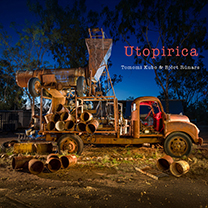October 6, 2025
Utopirica - Tomomi Kubo & Björt Rùnars
 Label: self-released
Label: self-released
Catalog #: no catalog number
Location: Barcelona, Spain
Release Date: September 25, 2025
Media: digital download
bandcamp.com entry
discogs.com entry
Tomomi Kubo is a Japanese Ondes Martenot player, based in Spain, who works in both improvisation and composition. Björt Rùnars is an Icelandic cellist, who also has relocated to Barcelona, and who investigates a broad range of musical forms, including textured soundscapes. On Utopirica, the two musicians join forces for a debut release of creative music that isn't easily pigeon-holed. Its ability to escape simple classification is, of course, part of the appeal. We suppose the combination of electronic keyboard and acoustic strings might allow us to describe this as an electroacoustic duet, but that nebulous term contains its own set of preconceptions, to which this album does not adhere.
The high, long, malleable notes of the Ondes Martenot are unmistakable in each piece. The cello too has its own distinct repertoire of sounds, from short plucked notes to reverberations induced by the drawing of the bow. Both musicians explore the full range of their instruments as they create a dialogue. The tone of the resulting musical conversation is friendly and invites the listener to eavesdrop on the exchange. The music possesses a clear blending of wayward improvisational and melodic tendencies. Neither voice plays the role of a harsh antagonist. To the contrary, a gentleness permeates the album, taking on different manifestations from track to track. Maybe on the track, Noctiluca, there is a moment or two of dissonance, but it dissipates almost as soon as it comes to the listener's attention. Yes, it is possible that on the track, Kagerou, there is lamentation in the cello and voice but the Ondes Martenot bubbles up through it, altering the emotional trajectory. And some tracks, like Naïve Moon, simply succumb to the temptation of a lullaby.
As soon as we heard this album the first time, the staff of the Poison Pie Publishing House knew they would have to pen a review of it, if only to share their enthusiasm at a music, which embodies a unique, human realization of a shared creative vision.
Having accomplished this task, we note unnecessarily that we like music that makes us think of other music, not because it is derivative or even because it is an example of a shared idiom. Instead, sometimes, once the listening gears start turning, they produce memories of other, ostensibly unrelated recordings. Utopirica was no exception. Today, it doesn't seem especially useful to share these idiosyncratic connections born of muddled synapses, and so we should probably keep them to ourselves. Still, here we are. We've said the important things about the music and we still appear to be writing. Monday afternoons in autumn can have that effect. This album brought to mind two older recordings, which pair the alien voice of an unusual instrument with a stringed instrument. One of them was King Pawns (Zenbei, 1998) by Hans Reichel & Kazuhisa Uchihashi, where the daxophone plays the role of cryptid and the strings are bound to a guitar. We think of King Pawns because while the daxophone of Reichel was capable of full-throated terror, he never used the instrument in a scary way, preferring instead to elicit humor and joy. In the duet with Uchihashi, there is the first intimation of an ominous tone in the instrument. On Utopirica, we felt that the cello of Björt Rùnars invited at times the Ondes Martenot into an ominous landscape in which Tomomi Kubo does not frequently venture.
The word, Utopirica, was new to us. When we searched for it on the internet, google repeatedly suggested that we wanted to know about Utopia instead. We ventured to translate the term and was told that utopirica is a Slovenian word, meaning "a drowning woman". We have no confidence whatsoever that this was the intention of the musicians who created the music on the album. We don't hear the frantic thrashing, which we associate with drowning, in this music. Instead, we would rather make up our own definition of Utopirica, as in a "utopia of tapioca". It's really a contradiction because, since we were children, we have never liked the texture of tapioca pudding, despite its sweetness. Nevertheless, this definition makes more sense to us because the music on the album makes perfectly palatable a texture that one could not possibly be expecting to discover.
personnel:

